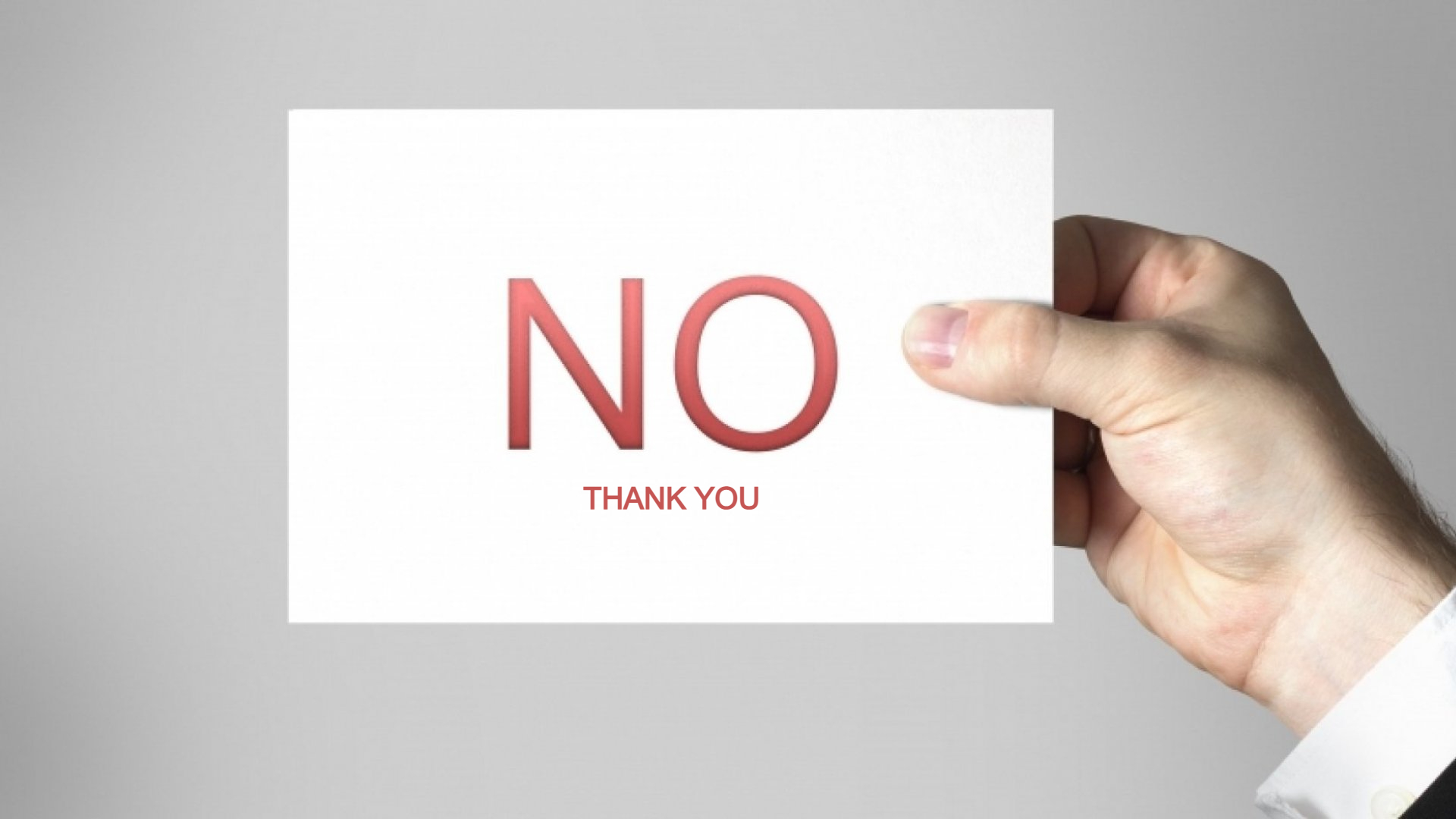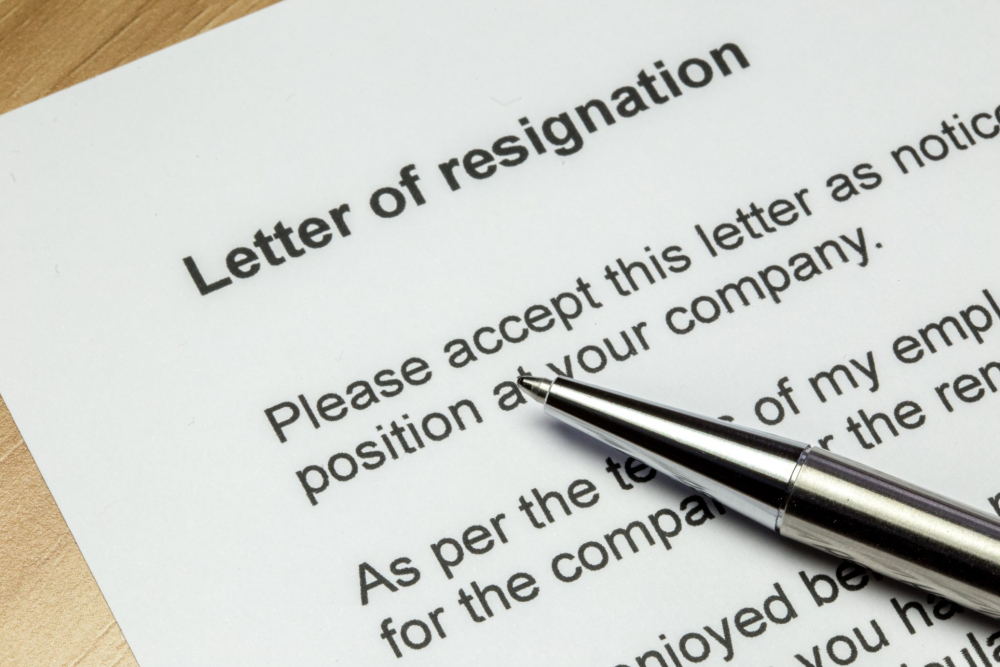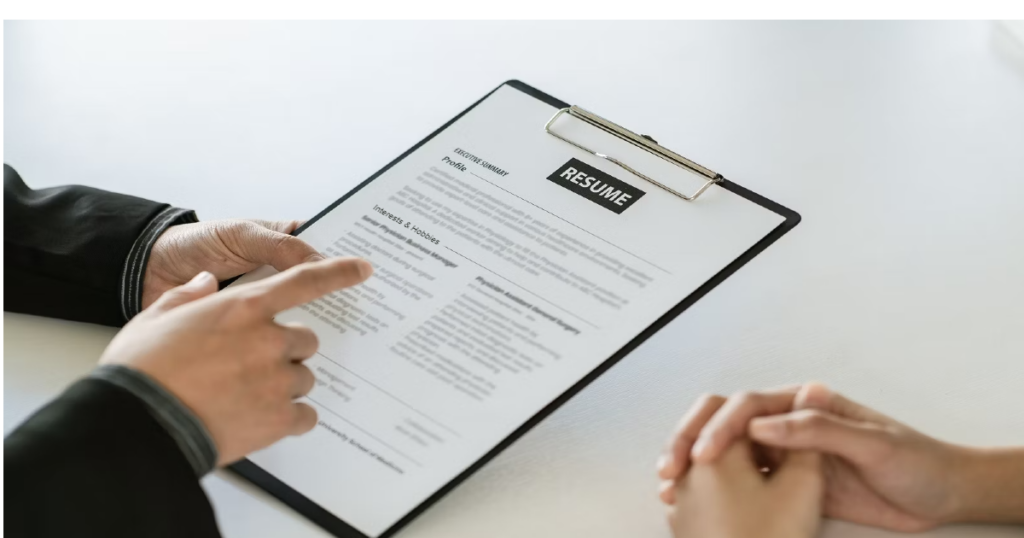
As a recruitment solutions firm, we understand that it takes hard work for you to organise your resume, write a good cover letter, or even go out of your way to get recommendation letters from your former company, just so you may get the chance to land an interview.
However, as exciting as getting an email from a potential employer informing you that you’ve been shortlisted as their candidate, there might come a time when you need to reject or decline the interview.
Even after applying for a job, you’re entitled to reject an interview if you feel that the position is no longer a good match. It’s not your fault for realising later on that it’s something you’re no longer interested in. On the other hand, if you’re already attending an interview for a job you don’t really want, then that’s on you for wasting the time of the parties involved!
Hence, it’s better if you politely and promptly decline the interview session.
We know that it might seem wrong for you to turn down an interview, especially when you’re still looking for a job. However, there are still a number of reasons that are acceptable, which may cause you to reject an interview. These reasons include:
It can be tough for you to make a call to decline a job interview. This is why you should take your time to really consider if you’re the right fit for the company, upon going through the application process. While there may still be some uncertainties in your decision, it’s better for you to decide quickly, and respond to a potential employer’s interview email/call as soon as possible.
Your immediate response will be appreciated by the hiring manager, especially if you’ve already set up a meeting with them. It shows that you are mindful of the hiring manager’s time and priorities. They may then use this opportunity to inform or scout for other candidates who fit the job.

Even if you’re sure that you’re no longer interested in this particular job opening at this point of time, you should always be polite, respectful, and gracious when turning down the job interview (no matter whether done over email or call). This will help you avoid burning any bridges with the company. There could be a time in the future where a more relevant opportunity arises from the same company, and you want to be shortlisted as a potential candidate.
Aside from that, we’re also living in a highly interconnected world. Most industries and hiring managers have a network of their own within the field of human resources to help them identify and scout potential candidates. Similarly, they might also gain blacklisted candidates’ details from other companies as they run their background checks for shortlisted candidates. If you’re rude to any hiring manager upon turning them down, you might end up closing all doors to the jobs that are aligned with your goals and values.
When you’re turning down a job interview, you don’t need to go into great detail on why you’re rejecting the job! Your email should be written in a clear and simple manner. Over-explaining your reasons might be seen as an excuse, and is often mistaken as being rude or inconsiderate to the hiring manager.
The sole purpose of your email is to let the hiring manager know that you have a change of heart, say thank you, and for him/her to proceed with other potential candidates. Hence, all you need to do is to communicate politely, with a brief explanation that you’re rejecting the interview opportunity.
Closing your door of opportunity might open the door for another lucky individual! If you have someone in mind who might be right for the job instead, you can suggest their name and contact details to the hiring manager upon turning down the interview.
This shows that you’re considerate to the company by providing another candidate who’s hopefully more suitable for the job. However, make sure that you’ve discussed the job scope with the potential candidate before suggesting their name, to ensure they’re genuinely interested in this job opportunity.

Subject: [Position] Interview Cancellation
Dear [hiring manager’s name],
Thank you for your time in reviewing my application, and considering me as a potential candidate for the [job] position. Unfortunately, I have accepted another job offer that is more aligned with my career goals. Hence, I’ll be withdrawing my application.
However, I’ve been following your company for many years and have been impressed with all the work and contribution to the industries. It’s my hope that I can work in your company at a later date, in a role that is more in line with my goals. Kindly keep me in mind for future openings. I would be highly interested in a position in your [preferred department] as I’ve been developing my career in that direction.
Again, thank you for your time and opportunity.
Best regards
[Your name]
Subject: [Position] Interview Withdrawal
Dear [hiring manager’s name],
Thank you for considering me for the [job] position at [company name]. I appreciate you for shortlisting and inviting me for an interview on [day], [date], at [time]. Unfortunately, I will have to withdraw my application and cancel our interview, as I have decided not to pursue this job opportunity at your company.
Please accept my sincerest apologies for any inconvenience caused by my withdrawal.
I am grateful for your time in reviewing and processing my application, and I hope you will find a more suitable candidate for the position.
Thank you.
Regards
[Your name]
We understand that you might feel there’s a need to justify your decision to cancel the interview, and apologise for it. However, it’s best to just let the hiring manager know that your intentions have changed, without explaining the specific details on your end. Most interviewers will accept and appreciate your prompt reply to reject the session, allowing them to arrange an interview for other candidates. Good luck with finding the right job for you!

Getting a new job is always exciting. However, the job, the responsibilities, and the salary are not just all you have to keep in mind. While accepting a job offer, it is also vital that you consider the remuneration package you are entitled to.
Being aware of all the cash and non-cash benefits your job comes with is important for determining your worth as an employee, and can also be helpful for negotiating a package that you are entitled to.
This article aims to help you understand what a remuneration package entails and how to negotiate the best offer, as per your skills and experiences.
A remuneration package is widely understood to be a part of the total compensation that is offered to an employee in return for their services.

As a form of compensation, remuneration is not just the base salary or employee benefits enjoyed by an individual, it also includes commission payments, overtime pays, bonuses, and other financial benefits that the employee is entitled to. Remuneration also includes any kind of direct payment and other taxable fringe benefits, like incentives and access to company vehicles.
The remuneration package you receive can be dependent on several factors, including your value as an employee. An employee with in-demand skills is likely to get better compensation and perks, than someone who doesn’t come with the same level or skill set. Therefore, it plays an instrumental role in skill acquisition.
The remuneration package is one of the most important discussions in the hiring process and is often negotiated as a part of the retention strategy. It is also re-evaluated if and when you are promoted, or during your annual evaluation. Depending on your performance, your benefits can also be altered.
However, you must also keep in mind that the salary you receive and the remuneration offered to you are not the same. While the salary refers to the fixed amount of money your employer pays you at the end of every month for the services provided by you, remuneration is the total amount of monetary (including other forms of) compensation you enjoy throughout your service tenure. In other words, this package includes the salary, as well as other benefits that come with the job.
Remuneration packages are usually divided into the following categories:

Direct compensation is a kind of remuneration that is indicative of any direct monetary payment that you receive from the employer, in addition to your salary. Direct compensation includes (but not necessarily all of) commissions, tips, and bonuses, which serve as incentives that motivate an employee to perform better to gain more perks and awards.
Unlike direct compensation or remuneration, indirect compensation or remuneration does not come with added financial gains. Instead, they come with perks like access to a company vehicle, flexible work hours, retirement schemes, insurances, and more. Indirect compensations are a great hiring strategy and go a long way in creating a positive impression of the company. Indirect compensation can also include health and life insurance, paid leaves, transit allowances, and equity-based programmes.
So, now that you know what a remuneration package is and what it entails, it is up to you, the candidate, to negotiate a package that is worth your skills and experiences. But how do you do that? Let’s find out!

Remuneration packages are not always the same for all employees, even though they are working in the same company. While having in-demand skills is one of the biggest determining factors of your remuneration package, there are other factors that often influence the type of compensation you are entitled to. This includes the pay structure of the company, and your status in the company.
Similarly, your seniority is also another proponent that will determine your remuneration package; for example, if you are a C-suite executive, you will be offered greater benefits than managers, supervisors, or entry-level employees.
The other important factor to be considered is the business model of the company. Bigger companies are able to afford more comprehensive remuneration packages and benefits, than smaller or medium-sized companies.
The package is also affected by the type of business undertaken by a company and the in-demand skills preferred by companies. On average, if you have the skills necessary for working in the tech and digital industry, you can enjoy great benefits along with a hefty pay rise in your salary every year. This is due to the increasing demand for IT security roles and technical roles based on digital transformations.
By working as an IT security lead or a data scientist, you can enjoy an increase in your salary by almost 20%, while a 15% salary hike has been recorded for software developers, automation experts, and other digital transformation-led roles.
If you have trending skills like digital analytics, CRM management, digital marketing management, and digital content management, you will be majorly favored in the digital industry and can expect a good remuneration package.

By keeping the below-given points in mind, you can negotiate for a better remuneration package that will match your skills, experiences, and expectations appropriately:
A job interview can be a tricky platform with uncomfortable or awkward questions. “What’s your expected salary for the job?” is one of them! While seemingly innocent in its appearance, this question holds a lot of gravity, and if answered properly, can be a potential game-changer for you.

While it’s a straightforward question, there is a reason behind companies asking this. They allocate a specific fund to compensate their employees. By asking the question, they ensure that they are able to provide the salary anticipated by candidates. This question also allows companies to establish whether the candidate is qualified for the position.
Expecting a much higher salary may leave the impression that the candidate is overqualified for the position, while expecting a salary that is significantly lesser than the standard amount might indicate that the candidate lacks sufficient experience in the position. In addition, this question also lets companies know if the candidate is aware of their worth as an employee.
To be able to come up with an impressive answer to the question, you must keep in mind the following:
Here are some great ways to answer the question:
While answering, make sure that you stay within the industry salary standards for the position you are interviewing for. Also, avoid giving an exact amount, instead always provide a range and mention the reasons for stating the amount you did.
With an ideal compensation package, you can ensure a great start for your professional career. By negotiating a flexible, positive remuneration package, you can reach professional goals and milestones in your career with greater support and satisfaction.
We hope the above-mentioned tips will help you negotiate a package that is worth your skills and your contributions to the company you join.

At a job interview, you’d want your potential employer to think the best of you.
However, what many end up doing during an interview is painting a picture of nervousness, instead of leaving a good impression. There’s no doubt that for anyone undergoing the interview process, the emotions of fear and anxiety would linger until you’re out of the door and done with the task.
But, with a little help and preparation, there’s no need to choke and stutter when a potential employer asks you to tell them a little bit about yourself.

First thing’s first, you need to know about the company you’re planning to join, and what the employer expects from you.
It’s crucial to find out what the hiring manager expects in terms of duties, qualifications, and experience before walking through the doors of your potentially new office.
And don’t be caught off guard if your interviewer surprises you with a random question about the company’s origins, to test if you know enough about them.
What the company does, its current dealings, and what is expected from you, can all be easily found on their website. Basically, you’re out of school, but you still have to do your homework!
A common mistake many job seekers make would be giving answers on the fly. Remember, you may not be the only one the company is interviewing to fill up a vacancy, so make sure your answers impress, to leave an impression.
Once you’ve made sure you’re equipped with all the necessary information about the company before attending the interview, it’s time to check out what you have in your wardrobe!

The sad thing is, we live in a superficial world. As much as we’d like for interviewers to assess potential employees based on skills, experience, qualifications, and perhaps even that charming personality – your physical appearance at the start matters more than we’d like to admit.
Here’s the easy part, you don’t have to start lifting iron at the gym just to make yourself look more presentable.
All you need is the right attire!
Basically, your dressing is a reflection of who you are, and you should definitely dress for the job you want. This depends on the company conducting your interview too.
For more corporate jobs, a professional look is required. If the job you seek is at a start-up company in the creative or tech industry, for example, then you’d probably make a better impression with a smart-casual look.
A quick tip: Make it a fun activity with a friend or family member! Get someone to do a mock interview with you, so you can work together on improving your first impressions. Mom or dad would also have some good advice on what to say, and how to conduct yourself.

Alright, you’re facing the interviewer now. Make sure to start off with a warm smile and polite greeting. Usually, a ‘Thank you for considering me for the vacancy’, or a ‘Thank you for inviting me for this interview’ works best.
Be sure to exude confidence, it’s a must-do for all who are attending an interview. Body language is essential in creating a great first impression.
You want to keep things professional, but still light and amicable, so you don’t accidentally ‘chill’ the atmosphere.
Maintain proper eye contact with the interviewer; good eye contact conveys your openness and interest to the interviewer, as well as shows that you’re assertive, attentive, and amiable.
Oh, and, please don’t slouch. You’re at an all-important interview, not Netflix and chilling at home on the couch!

‘So, tell me about yourself’. Common question; seems like any coherent answer would do, right?
Well, Coaching Creative founder Alina Campos suggests that interviews are usually initiated with a lot of small talks to get the ball rolling, which then leads to serious business.
“The interviewee’s nervous, but the interviewer’s trying to get their bearings too,” Alina Campos said.
Interviewers also ask the above question to gauge the job seeker’s confidence, level-headedness, and temperament to see if he/she would be a right fit for the job.
This is important for jobs like customer service, as well as sales and retail, given that they require some form of professional public relations skills to deal with (sometimes difficult) individuals.
Preparing and delivering carefully crafted answers will guarantee that the interviewer understands you, has an idea of your potential, and is made aware of your skills to efficiently tackle the job to come.
Furthermore, it shows that you put in the effort and did your homework. Employers appreciate that! Now, depending on how you put forth an answer, it helps interviewers decide what to ask next.
So here’s a trick: Whenever possible, craft your responses in a way that leads the interviewer to put forth further queries, where you can shine when answering.
A good way to achieve this is by leading your interviewer to your ‘professional story’. Basically, it’s how you grew and developed into who you are today. And no, we don’t mean where you grew up and which high school you went to.
Talk about your passions, achievements, skillset, and the influences which pushed you to try applying for jobs that bring out the best in you. Don’t be too lengthy in your answer though; three to five minutes should be more than enough.
Another good way to go about this question is by using the ‘Elevator Pitch’. This method requires you to craft a 45-70 word answer, and is done by tailoring your answers to match the job requirements. This allows you to explain yourself succinctly, while at the same time, generate interest in who you are and what you do.
In both of the methods explained above, you can bring up your past work experience that’s relevant to the role you’re seeking.
You can also cherry-pick and (gently!) push your interests, strengths, and work ethic to the interviewer in order to stand out from the crowd. Any one of the methods should do you well, but make sure you choose the one that suits you best.

It’s towards the end of the interview, you’ve thrown everything you got at them, and they seemed pleased so far. Now what?
Like the conclusion to a Whitney Houston concert, you want to end the interview on a high note. So, make sure to thank them for their time and consideration in shortlisting you for the job opportunity, and clearly state your intention to follow up.
Make sure you actually do follow-up with the interviewer and the company after you finish your interview.
You should request for the contact information of the interviewer/hiring executive so that you can continue to communicate with them. This may allow you to get additional information such as the duration of evaluation, a second interview, and perhaps to give him/her any references from your side.
You can also send any follow-up notes or information you may have missed out in the interview.
With the 5 tips above, you can be well on your way to dazzling your way through any interview that you’re attending. Always stay confident, and remember, “You miss 100% of the shots you don’t take.” –Wayne Gretzky.

When something goes wrong, it is often referred to as a problem. We all face problems everyday, whether in our personal life or the workplace. They are undesirable events that can cause a domino of other difficulties, eventually becoming a hindrance in accomplishing goals. In order to ensure operations are always running smoothly in an organisation, problem solvers can often save the day.
Problem-solving involves the technique of recognising a problem, establishing the source of the problem, as well as identifying, evaluating, and examining options for the best solution, and lastly, applying the solution to solve said problem. If you want to advance in your career, developing this skill is essential. Most occupations require solving problems to a certain extent. Employers value problem solvers because they want someone they can rely on to remain calm and composed, and think things through logically when anything goes awry.
A significant part of problem solving includes establishing the root cause of the problems rather than just the symptoms. A customer complaint, for instance, is a problem that must be dealt with. To do this, the first step is to inquire about the reason for the complaint because once the source is identified, it can be eliminated to remedy the problem. Here are five steps commonly used in solving problems:
Finding out the cause of the problem requires gathering and analysing data, isolating potential causative elements, while evaluating which components must be addressed to achieve a solution.
Relevant skills: Data gathering, data analysis, historical analysis, and fact finding.
A single solution is rarely enough when it comes to solving complex problems. The next step is to consider a range of potential remedies to cover all the necessary bases, and minimise chances of failure. So that when one plan fails, another plan can be implemented to solve the problem.
Relevant skills: Thinking outside the box, brainstorming, forecasting, prediction, project planning and design.
This stage of the problem solving process is typically done by higher rank employees such as team leads or relevant decision makers. It involves estimating potential costs, the necessary resources, and possible obstacles to effectively implement a particular solution.
Relevant skills: Teamwork, discussion, analysis, collaboration, test development, mediation, and prioritising.

Once there is a plan of action, it must be employed together with assessments that can quickly and correctly evaluate whether or not it is working.
Relevant skills: Project management, project implementation, collaboration, time management, benchmark development.
Implementing a solution is one thing, but having systems in place to gauge how or how well it is working is necessary to know if any adjustments need to be made, or if the problem is entirely solved.
Relevant skills: Data analysis, communication, customer feedback, surveys, follow-up, troubleshooting.
Problem solving skills assist in identifying the cause of a problem and devising an appropriate solution to overcome it. While it is a skill on its own, there are other related skills that contribute to this ability.
Conducting research is essential to pinpoint the cause of a problem and understand it completely. Then, it is about gathering additional information about the issue at hand by brainstorming and learning in order to look at it from different angles.
It is important to first assess the situation before beginning to solve any problems. Analytical skills help in assessing challenges and employing impactful strategies. They also go hand-in-hand with research skills to evaluate good and poor ideas.
You’ll likely end up with several approaches to overcome a single problem. The ability to assess the benefits and drawbacks for every strategy is essential to evaluate the best approach, and whether or not it is attainable or feasible for the business.
Evaluation skills determine which solution to a problem is the best. Another skill you must master is the ability to collaborate with others and draw on their knowledge to better understand all of the possible angles to the given problem. Then, once you’ve found a good solution, your decision making skills will make the call and put it into action.

The ability to communicate effectively is vital in ensuring that all team members are on the same page. You must be able to convey the problem, ideas, and propose solutions so that they can be successfully implemented.
Some problems are more complex than others. This is why to be a great problem solver, you need to be able to think creatively to find the best solution. Work together with people to understand the issue in-depth, what has been tried before, as well as exploring innovative ideas to tackle it.
Dependable and trustworthy employees are what employers are looking for. Not only will you help them to look good as daily operations are always kept moving smoothly, but they don’t need to keep checking up on you to make sure you get the job done.
Some people are born with natural problem solving skills. You can also develop or improve these skills with experience and practice.
Practice solving various hypothetical problems so that you familiarise yourself with the problem-solving process. Doing this with someone else from the same profession will help keep things interesting. Whenever possible, try role-playing to further hone your problem-solving abilities.
Problems exist in every facet of life. Rather than shy away from them, you should take every chance you can to get creative and come up with solutions.
To become a well-rounded problem solver, you must continue to learn and stay up-to-date in your field of expertise. There are a ton of courses available that’re industry-specific. This way, you can learn about the possible challenges that you may face down the line, as well as how others in the industry effectively deal with these challenges.
Although certain skills are unique to particular industries or career paths, there are basic capabilities that apply to several professions. These are regarded as fundamental employability capabilities that let employers know what kind of employee you’ll be down the line.

Employers are always searching for individuals who possess these qualities. The more relevant your skills are, the more appealing you’ll seem to hiring managers. Here are the top employability skills that recruiters are searching for:
Emphasising your most desirable skills on your resume and cover letter immediately makes it more attractive. It can also help you to better articulate the value you can bring to the organisation.
You can showcase your problem-solving skills on your resume either in the “skills” or “achievements” section. Ideally, you should have specific examples which you can state in short and succinct phrases. Instead of simply claiming that you’re a problem solver, define the valuable problem solving skills you have that’re intrinsic to the special trait you possess.
A cover letter is another great place to emphasise and elaborate your problem-solving talents. Past experiences are most convincing so give several summaries of any past instances where your problem solving skills saved the day. If you don’t yet have any stories to share, do some research and look into a problem that you think your potential employer is trying to solve or might face in the future and describe how you plan to solve it.
During the interview stage is where you can elaborate on the points you included on your CV and make them come alive as you tell the story in person.
Do you have a knack for nipping challenging problems in the bud? Are you someone who tackles problems from a logical and creative angle, evaluates viable solutions, and solves them in a timely manner? If this is the case, your problem solving skills will serve you well throughout your career. They’ll even continue to level up as you gain more experiences.
One of the primary ways hiring managers and recruiters evaluate candidates is their ability to solve problems, as those with excellent problem-solving skills are more likely to work independently and proactively. If you’re still on the lookout for your dream job, keep a list of the jobs you’ve had and the problems you’ve solved along the way. So that when you see a job posting that you think will be a great fit, all you need to do is update your CV and sell your skills further at the interview to seal the deal. Good luck!

Job interviews can be the stuff of nightmares. There’s the one-on-one, or sometimes even one-on-a few-other-people, who are there to judge you while you answer some of life’s toughest questions to land a job. One interview question that you can rarely escape is: “Why should we hire you?”.
This question might sound simple and straightforward, but how you answer it speaks volumes, as it has the power to set you apart from the other candidates vying for the same position. To help you formulate the best response so that you’re prepared to look your interviewers in the eyes and knock their socks off with a confident yet effective answer, this article is for you!
Before we dive into the examples, it’s first important to understand why this is a favourite question among hiring managers. Once this question is out in the open, your body language, the way you reply, and what you say will then be assessed. Interviewers ask this question to find out a few things. First, they want to know why they should hire you over other equally suitable candidates.
Secondly, they want to observe how you deal with challenging situations because this question has the ability to trip up applicants, especially those who come unprepared. Third, how do you explain that you are the best candidate for the job without coming off too strong or sounding too boastful?
The key to nailing this crucial interview question is with a little research and a lot of preparation. Ultimately, you don’t want to tell an hour long story, so it’s important to nail down the most relevant, effective responses.
You can find out the exact skills, qualifications, and experience that the particular role requires through the job posting or job description. Go through all the points and look for connections with the abilities, knowledge, and character traits that you can bring to the table.

Research the company’s vision, mission, goals, and recent announcements to gain more insight and ideas for crafting the ideal response. You can use this information to explain how you’re aligned with the organisation’s values, and how you can be a reliable asset in achieving key business objectives. Another important point you can emphasise on, is how you fit into the company’s culture.
Once you’ve compiled a comprehensive list of the skills and attributes required for the role, think about how you can demonstrate that you possess each one. Whether in a professional, academic, voluntary or co-curricular context, describe how you used the skill or exhibited the quality in getting something done. Make a point of mentioning any successes or accolades you obtained as a result of using the talent.
For instance, if a position requires good leadership abilities, you could say:
“During my internship at X, I led a team of six in launching an effective marketing campaign that resulted in an increase in sales.”
Wherever relevant, use numbers or other quantifiable data to back up your successes. For instance, using the example given in the previous point, you could say that due to your successful marketing campaign, the company saw a 30% increase in sales.
Practicing your pitch is necessary, but it’s not a good idea to memorise your response word for word. You not only run the risk of seeming bland, or inauthentic, but you might also get distracted and struggle with getting your response back on track. It’s advisable to have a general idea of the points you want to convey, and then adjust your answers based on how the interview is progressing to create a better conversational flow.
Preparation is essential in helping you narrow down effective responses that speak directly to what your potential employers are looking for. If you simply wing it and list a bunch of reasons why you think you’re the best candidate, your answer will seem disorganised and less compelling.
Striking a balance between talking about your achievements and being too confident can be tricky. If you come across as arrogant, it may raise some concerns about how you’d perform, or fit in a team as an employee. The best way to avoid this is to keep your responses brief and precise, conveying only the most important (and relevant) points.

Here are some examples that you can immediately use, or even to guide you in coming up with your own customised response:
In my eight years as a sales manager, I’ve successfully led teams of more than 15 employees. My motivational techniques earned my region the title of “Region of the Year” five years in a row for continually reaching and exceeding sales targets. I look forward to applying my experience as a leader to this role.
As a recent graduate with a Bachelor’s in Communications, I believe that I can contribute cutting-edge email marketing techniques and ideas to your business. During my internship as an email marketer for a digital software start-up, I gained hands-on experience in creating engaging content within a fast paced environment. My participation in an email campaign resulted in an 11% increase in engagement. I’m confident that I’d be a great asset to your email marketing team because of my knowledge and experience in the field.
I meet all of the requirements for the position, in terms of skills and experience. As a result, I’m convinced that I’d be an excellent fit for this project management role. My experience in leading successful projects for the top companies has taught me a lot, including my excellent people skills which have helped me to foster great relationships with vendors, developers, and senior managers alike. On top of this, I’m passionate about the field, and I’m committed to producing high-quality work.
Frankly, I think the job description was crafted specifically for me as I have six years of programming experience, a glowing track record of successful projects, and proven proficiency in agile development procedures, all of which you’re searching for. Moreover, working directly with senior managers has improved my communication skills, and I’m well equipped to work on high-profile projects involving multiple departments. I’m confident that I have the necessary experience to contribute right away and I’m looking forward to the opportunity to do so.
According to the job description, you’re in search of a sales executive with experience in managing a team of at least a dozen personnel. In my five years as a sales manager, I’ve honed my ability to motivate, inspire, and build strong teams of up to 15 employees across different departments. My inventive ideas in encouraging employees to reach (and exceed) quarterly deadlines has earned me the title of manager of the year in my previous company. If you hire me, I’ll apply my managerial skills and business acumen to work for you.
The key to answering “Why should I hire you” is really about demonstrating to your interviewers that you’ve explored and discovered your finest skills and talents, found out how they define you and set you apart from others, as well as how you intend to use them to add value and fit into the company culture.
Do your research and create a list of your unique qualifications that are relevant to the role, study the examples above, and practice, practice, practice! Now that you’ve gathered all of the information necessary to construct an effective response, you’re well on your way to acing your interview. All the best!

You’ve landed yourself a job interview and are well-prepared with all the answers to the questions your employer may ask you during the job interview. Everything goes smoothly, and those practice sessions that you had with your mirror did not go to waste.
As the interview is coming to an end, everyone, including your future employers have a big smile on their face. But suddenly, you’re hit with quite the awkward question (with very little time to think it through): “So, what’s your expected salary for this job?”
This is such a simple question, yet it still remains one of the most dreaded ones for most candidates, as your answer might make or break your job application. But fret not! Today, we’re going to prepare you to answer this crucial question in every job interview.
Before knowing how to answer the question, you first need to know the motive behind it.
If you don’t already know, every company will allocate a fixed amount of funds for specific jobs. In other words, they have a budget to adhere to, before they can actually hire you, so they have to ensure that both parties are aligned with their expectations.
Candidates who expect a significantly higher salary than other applicants may suggest that they’re overqualified for the role they’re applying to. Similarly, if you’re giving a lower amount of expected salary, it could hint to your employers that you might lack the experience needed for the job.
With the list of job experiences and skills on your resume, your employers may be assessing how much you think you’re worth in the relevant markets. Promising applicants will give an appropriate amount of how much they believe they’re worth.
Most of the time, it’s very difficult for candidates to answer this kind of question, due to the nature of the hiring process. Imagine giving a number that’s too high. Your potential employers might just skip you over, and choose a candidate who has targeted a lower salary range.

However, if you’re giving too low of a number, your employers may try to push it to an even lower amount during the negotiation phase, and that’s definitely not going to work in your favour in the long run, especially if your workload keeps increasing down the line.
Knowing that, it’s still difficult for a candidate to give a near-perfect answer before knowing the full job description, or the company’s budget for the role that’s being applied for. While there may be no right answer to this question, there are ways that you can better prepare yourself for it.
To know the company’s budget in hiring you, you first need to know the average market salary. Take note that different locations may have different salary ranges, even though you’re applying for the same job. You can also look into the wages of the people who are currently working the job you’re applying to, and see how their experiences and educations affected their salaries.
When you’re answering what you’re expecting of your salary, it shouldn’t be solely based on just your experience and education. You should take into account the expenses you might have in taking the job. Suppose the job requires you to relocate or travel a great distance to a specific area where the company is located. In that case, you should ask for the cost of relocating or travelling in the form of direct compensation, or for the amount to be included in your salary.
Candidates tend to offer a specific number when it comes to the expected salary. However, providing your employers a range in which you’d like to earn is also a viable option. If you decide to offer a range, remember to keep it tight, rather than wide. If you’re expecting to earn $5,000 a month, it’ll be wise to offer a range between $5,000 to $6,000 as your expected salary.
Your gross remuneration shouldn’t be the only thing you’re considering and negotiating in a job interview. If you’re up for it, your employers may be willing to bridge the gap between the salary they’ve offered and the salary you’re expecting with other benefits and perks, which are just as valuable!
Sometimes, even in the early stages of the hiring process, you might already be asked about your expected salary by the hiring manager. As always, this hard-to-answer question is even more challenging to answer when you’ve yet to grasp the full understanding of the details of the job or position you’ve applied to. Don’t worry. It’s perfectly normal for you to deflect this question, but you have to do so tactfully (refer to Example #3 below).
As mentioned previously, there are multiple ways in which a company may compensate you, which include health benefits, annual leaves, stock options, flexible work arrangement, and perhaps even a free laptop. Although it doesn’t seem much at first, these types of compensation are equivalent to your ideal salary, and are able to provide you with a more balanced work-life.

Thank you for asking this question. While I am flexible when it comes to the range of salary, I am looking to receive between [Amount A] and [Amount B] annually/monthly. I believe that with my set of skills and experience level, the range I provided would be comfortable and appropriate for this position.
I am expecting to receive a baseline of [the amount] annually/monthly. I believe that with the expertise and skills I can bring to this role, the amount I suggested is an appropriate salary. Is this in line with your expectations?
Before I give you an answer, I feel that it will be more appropriate for me to give a range after I get more acquainted with the position and company, so that I’m able to provide a more accurate amount that fits both of our expectations.
Once you grasp the average salary range for the position you’ve applied for, consider giving a higher amount. In most cases, your employers are going to try and negotiate so that they can offer you a lower amount, in which the amount might still be making your targeted number.
Giving an exact amount to your hiring managers may suggest that you aren’t open for negotiations. Hence, it’s best to provide the range of your expected salary instead.
While it doesn’t hurt to share how you arrived at your expected salary, don’t bore them with too many details of the deep thinking process you’ve had before coming to the number you’ve given! You can justify the amount of your expected salary by describing your past experiences, including education, and how these experiences and knowledge can aid the company. Remember, try not to give too high of an amount for the role, or you could be considered overqualified.
And by ‘sweet spot’, we mean the middle ground/happy compromise that your negotiations with the hiring manager should arrive at! While you can do your best to ensure that you fit within the hiring budget of the company you’re applying for, at the end of the day, the decision still lies with the management. At least you can come away from the interview knowing that you’ve put your best foot forward, and didn’t sell yourself short. Good luck!

There’s no definitive way of describing an ‘ideal employee’. A particular trait can prove to be both advantageous or detrimental for a designated post. For example, an employee with leadership qualities is usually valued by organisations worldwide, and is one of the most important parts of leadership is being assertive. But, at the same time, when working within a team setting, being overassertive reduces the cohesiveness and the effectiveness of the team.
Hence, while there are no clear-cut criteria for selecting candidates, there are a few traits that employers value when hiring employees. So, which would make a candidate stand out in the eyes of companies? And, as a candidate, how can you highlight those personality traits in your CV? Let’s find out!
Character traits are different aspects that constitute our personality. When selecting a prospective employee, the recruiter pays special attention to the character traits which will not only suit the job, but will ensure that the employee fits into the company culture.
Hence, it’s important to highlight those particular personality traits that would help you secure an interview call, and eventually get the job. This is one of the reasons understanding the job requirements and researching the company before applying is so important.
How do character traits come into play in the selection of a candidate? For instance, a person who displays confidence, adaptability, has good listening skills, and is diplomatic indicates they’ll make a good leader. Similarly, character traits such as dependability and humility signify that a person is a good team worker.
And, a healthy dose of independence guarantees that a person can function well, even without supervision! These are just a few examples of what character traits employers look for when filling a particular job position.
There are actually a few personality traits that are standard, which can be applicable for all kinds of jobs. If you have these and can properly highlight them in your CV, they’ll increase your chances of getting that coveted interview call.

Highlighting your character traits in your job application will always give you an edge over the other candidates. Here are tips on how you can present your character traits to potential employers:
Make sure you hone the above-mentioned character traits, and utilise the tips given here to highlight them when applying for a job. You never know, in a crowd of equally suitable and qualified job applicants, highlighting your character traits might just be the only thing that tips the scales of getting the job in your favour!

For centuries, it has been common practice to classify different types of workers by the colour of their shirts, or “collar” colour. These designations mainly include blue or white collar, but you may have also heard of pink, green, or gold collar workers. Our minds conjure up different, distinct images when we think of these different types of classifications, as we use these to classify the different types of employment and the nature of work.
Blue collar jobs are typically associated with manual labour out in the field. Whereas white collar employees are usually seen in the office setting. These terminologies are derived from the attire worn by these workers in history. Blue uniforms were common among manual laborers, and white dress shirts were common among office workers.
The distinction between the various collar colours nowadays is mostly symbolic rather than a description of present attire. Although seldom used formally, they come up in ordinary conversations and political debates, so it’s crucial to understand the differences. Understanding how they compare with each other also helps job seekers to tailor their job searches to better suit their particular set of skills and profession.
The term “blue-collar” originated from the beginning of the twentieth century, referring to the blue chambray, overalls, and denim garments that were typically worn by manual laborers at the time.
Rather than sitting at a desk, these personnel get work done by utilising their physical abilities. Due to the nature of their work, which generally results in soiled uniforms at the end of the day, dark-coloured shirts were a practical option for these personnel. The dark colour was shown to effectively conceal stains, grime, and other things that may soil work attire. As a result, companies began making more blue uniforms, and blue uniforms have remained a standard until this day.
When we talk about blue-collar employees, we’re typically referring to a segment of the workforce that relies on physical labour or industrial jobs to make a living. They’re also sometimes referred to as the “working class”. As a result, blue-collar work usually does not necessitate a college diploma, but may require a high school certification. Hourly pay is common among blue-collar jobs, but more advanced roles do offer fixed income positions.
Blue-collar labour can be further broken down to “skilled” and “unskilled” workers, where “unskilled” here simply means that the job can be done without prior experience or specialised education and training. Blue-collar employment can be found in a variety of settings, including workshops, factories, offices, houses, public areas, and outdoor locations. Some examples are:
White-collar personnel describe suit-and-tie workers who work at a desk or other office-based, administrative, clerical, and managerial roles.
Technology, accountancy, sales and marketing, and consulting are some examples of industries with a large number of white-collar positions. Nowadays, some of these roles can even be carried out from home.
Stereotypically, white-collar workers eschew physical labour as they rely more on mental rather than physical exertion to perform their duties. These employees usually work regular 40-hour weeks and have a set income and benefits package. Although white-collar roles are often thought to pay more than blue-collar jobs, this isn’t necessarily always the case.
Whether it’s a professional, managerial, or administrative role, white-collar workers are almost always required to have some level of experience to qualify for the job. This can either be a college degree (usually a bachelor’s degree or higher), or professional experience from a previous position. White-collar jobs may be diverse, yet the majority of working environments are similar. Examples include:

“Pink-collar” refers to any field that has historically been dominated by women. These jobs were once deemed “women’s work” in the sexist society of the (not so long ago) past. This classification is fraught with controversy, from disagreements about when the name was coined to its discriminatory connotation.
Today, the modern definition of pink-collar is used to categorise both men and women in the service industry or any roles primarily dealing with people. Although many of these jobs are still held by women and can often be lower paying than white- or blue-collar jobs, things are changing.
Pink-collar jobs include hair stylists, dental hygienists, flight attendants, restaurant servers/waiters, retail assistants.

A new trend is emerging in today’s employment landscape, due to growing concerns surrounding environmental issues and sustainability. People are ditching conventional jobs for green-collar jobs that safeguard the future of our planet by boosting sustainability efforts, reducing energy use, waste and pollution.
Green-collar sectors comprise of alternative fuels, energy efficiency, public transportation, and recycling, to name a few. They can range from small businesses to larger corporations or even non-profit organisations. Nevertheless, these roles are difficult to define as they range from manual to managerial. Green-collar positions are known to offer better opportunities, in terms of career mobility and higher wages.

With the rise in importance placed on a candidate’s practical skills (especially those gained in previous employment) rather than their four-year degree, the term “new collar” was coined to reflect this shift in hiring managers’ priorities. In other words, new collar jobs are newer, mostly technical jobs requiring a special set of skills, and do not necessarily require a college degree.
Besides tech roles, new collar workers can also be found in healthcare and mortgage sectors. New collar jobs include information security analyst, software developer, pharmacy technician, project manager, etc.
Traditionally, gold-collar workers are in the same classification as white-collar workers, but have grown so important to business operations that they warrant their own categorisation. These roles are highly skilled and in high demand. For instance, lawyers, pilots, surgeons, engineers, and anaesthesiologists are examples of gold-collar positions.
Red-collar workers are the easiest to define, as they refer to all the types of government employees.
Information technology (IT) professionals, for example, are skilled workers who fall in both the white- and blue-collar classifications, and therefore are known as purple-collar workers. These are primarily white-collar workers who occasionally perform blue-collar responsibilities, such as technicians and engineers.
Society has been known to judge people based on their vocation or career path. We commonly make judgments about an individual’s intelligence, personality, aptitude, and value based on the type of job they do, and the collar system puts people into categories from which we can further cast judgment.
However, as job categories merge and now require a combination of skills and strategies, society will benefit from combining all the colours of collars, and simply evaluating people based on who they are and the benefit they bring to others, rather than the type of job they do.
It doesn’t matter who earns more or who has the better job, all the different kinds of collars are equally as important and deserve the same respect! After all, not everyone shares the perspectives of what constitutes “better” or “worse”. At the end of the day, we all depend on each other to keep the wheels turning. A healthy society acknowledges that one end depends on the other, and vice versa.

Many reasons could lead to someone’s decision in leaving their job. Whether it’s new opportunities or personal reasons, a resignation is something to be expected. In fact, Microsoft estimated a whopping 40% of the global workforce are thinking of resigning from their current jobs, citing the pandemic-induced burnout as one of the many reasons. But what does tendering your resignation means?
Tendering your resignation refers to the act of notifying your boss or reporting manager that you’re leaving your job and resigning from employment in the form of a letter, email, or a face-to-face meeting.
Typically, your notice has to be passed to your immediate superior in advance, depending on the time stipulated in your employment contract, which can range anywhere from two weeks to two months. The rationale for an advanced notice is to ensure a smooth transition, including workload distribution among your team members and to allow the company sufficient time to search for your replacement.
To maintain professionalism and the interest of all parties involved, it’s highly recommended that a resignation process be carried out courteously.
Here are some tips that you can keep in mind to help you leave your job on a good note:
One of the best ways to leave a good impression on both former and future employers is by putting your resignation in writing. For an office or corporate job, this is often required as per your employment contract. This is usually done by drafting a formal dated letter addressed to your reporting manager and signed by you, including your personal details and information on your final day at the company. If you’re unsure whether to hand in your letter physically or via email, you can plan ahead by speaking to the HR department.
With that said, regardless of the type of job, providing a resignation letter reflects respectability between both parties. Aside from that, putting things in writing ensures that there’s a paper trail proving that you’ve given sufficient notice as required, and assists the HR department with document organisation.

In your resignation letter, be sure to explain your reason(s) for leaving your current position in the company.
For example, if it’s due to a new job offer, you can highlight how the current role has not only helped you to add value to your career journey in the form of experience and network expansion, but also allow you to contribute your skills in return.
If you’re leaving due to personal reasons, you may or may not feel comfortable sharing the exact details with your employer. As such, keep it simple, straightforward, and ensure that it’s worded politely.
For example, you can point out that while you had a highly enriching experience in your employment, you’re unable to carry out your duties and responsibilities due to personal reasons. Additionally, highlight that the company’s best interests has been taken into account in helping you to decide, and offer to assist with the handover process during your notice period.
Depending on your circumstances, you may also schedule a meeting with your supervisor to further discuss this in person. On top of a written notice, a face-to-face meeting shows willingness and added professionalism on your part to ensure a smooth transition throughout the resignation process.
You can talk about the handover process and confer on how to best distribute your previous work amongst your colleagues. In addition, scheduling a meeting will help maintain your rapport with your boss and leave a good impression once you leave your job.
When planning your resignation, remember to take into account the terms of your employment contract. Be mindful of details such as the notice period as well as any documentation that you’ll have to submit.
If you’re planning to schedule a meeting with your boss and/or HR, you can discuss this part of the resignation to clarify any doubts that you have, regarding the terms of your contract.
If your employment is not covered by a contract, this is a great opportunity to further discuss with your reporting manager on the relevant process and procedures.

This is one of the most important parts of the resignation process! Once you’ve decided and handed in your notice, it’s tempting to let your current workload go unheeded, and run its course.
However, this is where teamwork plays a crucial role to facilitate the transition period. Plan and discuss with your boss and colleagues, especially direct team members, on the distribution of tasks and responsibilities that they’ll have to take over from you after your departure from the job.
Dear Mr/Ms [Name of reporting manager/supervisor],
Please accept this letter as a [notice period] notice of my resignation as [role] at [company]. In accordance with my contract, my notice period will end in [duration] on [date].
Recently, I was offered a promising role, that will be a great opportunity for me to further enhance my skills in [relevant skills].
I would like to extend my gratitude to the [senior management] for giving me the chance to be a part of a company that has fostered my professional growth for the past [duration of employment]. I appreciate the continuous teamwork, advice, and support that we have shared throughout my time in the company.
Please let me know how I can be of assistance during the transitional period, in ensuring a smooth and seamless handover process.
Sincerely,
[Your name]
Dear Mr/Ms [Name of reporting manager/supervisor],
I am writing to inform you of my resignation from the role of [role] at [company].
I have recently accepted an up-and-coming opportunity which would further encourage my professional growth, particularly in [relevant skills].
Whilst I am looking forward to my journey ahead, I would like to firstly thank the Management for giving me the opportunity to contribute to the workings of the company and learn essential skills, as well as expand my professional network along the way.
During my transitional period, I would like to offer my assistance to facilitate a smooth handover process.
Sincerely,
[Your name]
Dear Mr/Ms [Name of reporting manager/supervisor],
I am writing to formally inform you of my resignation from [role] in [company]. Due to unanticipated personal issues, I have decided to hand in my [notice period] notice. My final day will be on [date].
During my time here, I have learned skills and given opportunities that I would not have been given elsewhere, had I worked with a different team or report to a different supervisor. I would like to extend my gratitude to everyone who has made my time here memorable.
With that said, I would also like to offer my assistance with the handover process, in ensuring that my replacement is well-informed of the tasks and projects at hand.
Best wishes,
[Your name]

Here’s how you can help in ensuring that your team can proceed seamlessly once you leave the company:
What are your daily tasks, what do they entail, and how do you execute them? Running through the details with team members assigned to take over your duties will help them understand it better. What’s more, it’ll help keep them up to speed when they perform them.
Showcasing the progress of your projects in a meeting will enable your teammates to visualise them, but the key to a smooth transition is by compiling them into one comprehensive file. Document the steps that you’ve taken for your role in the projects. Include a brief of the project and details on how you’ve contributed, plus the exact section in which the project is being put on hold to ensure a smooth transition for your departure.
While a compromise can be worked out for certain tasks and projects, some of them may still require your input, given your experience in handling them. Be sure to go over these pending tasks with your boss and team members, for which you’re required to complete during the notice period.
One of the crucial things that you can do to ensure a smooth transitional period is by taking note of essential contacts related to your current tasks or projects. This could be in the form of a detailed list, so the particular colleague taking over your role will be well-equipped with as much information prior to your departure from the role.
It’s important to manage expectations with team members who’ll assume your responsibilities after your resignation. The notice period will help buy you some time to make sure that all parties are in mutual understanding and agreement of the individually assigned duties.
To sum up, tendering your resignation can seem like an overwhelming process as you may or may not have to deal with a considerable amount of paperwork. Even more so if you need to slowly hand over your tasks to people whom you’ve worked with for a long period of time and have built a strong bond with. However, documenting your resignation process ensures a seamless process for your former employer to plan their future employment, and helps smooth your career transition.

Is it really necessary to list your hobbies and interests on your CV/resume? You’re not going on a date! When you’re preparing a professional CV, including your interests and hobbies may not be the first thing that springs to mind; after all, it should be professional. However, doing so may actually help to strengthen a CV in a number of situations, even (or especially) when you have little or no professional experience.
Some recruiters or employers even prefer resumes with hobbies on them since it paints a more complete picture of the candidate as a person. But, what exactly are your hobbies and interests, how can it help you to achieve your career goals, when is the right time to do so, and how can you list them to stand out of a crowd of competitive candidates? We’ll be looking into all of that and more here!
Hobbies are pastimes or activities that you do on a regular basis in your spare time generally for enjoyment, but they may also be a wonderful way to supplement your income. It could be anything a person chooses to spend their time doing when they are not working like engaging in creative and artistic passions such as music, dance, art, reading, pottery, or any kinds of sports.
Interests are subjects or topics that pique your interest and make you want to jump down the rabbit hole to uncover all there is to know about them or spend your free time participating in activities related to them. They have more to do with exploring ideas, knowledge, and different concepts. For instance, you might know some people with an interest in social work, pop culture, history, or even conspiracy theories. As you can see, both hobbies and interests are things that you like to do for fun outside of work. So why do employers want to know about them?
Your CV tells the tale of your education and profession, while your hobbies and interests section shows a bit more about your personality. They inject some colour into your CV and demonstrate how you would be a good cultural match for the company. It could also offer some great talking points during the interview, which could lead to bonus points and your interviewers will certainly remember you. Other candidates will have the same professional and academic sections, but we bet you may be the only stamp collector!

Candidates lacking adequate job experiences such as fresh graduates should include a hobbies and interests section so that the potential employer can have a better idea of who you are outside of work. It paints a more complete image of yourself and may even display certain soft skills that would be a good fit for the organisation. For instance, if you enjoy spending weekends doing social work, it’ll show that you are an empathetic person who can work well in a team (organisations love team players) and do not mind dedicating your free time to helping others.
On the other hand, if you’ve already accumulated a long list or a few years of job experience that can adequately demonstrate your professional abilities and credentials, and your one-pager CV is almost filled to the brim, you can definitely skip this section!
Generally, recruiters will take your hobbies and interests into account once you’ve ticked all the other boxes. You should include them to supplement your other information and seal the deal, instead of being your main selling point. What this means is you should include this section towards the end of your CV for a good flow. To prevent boring your reviewers with even more words, present them in a bulleted list of short phrases.
You can also elaborate a little bit more on every point, but keep it short – something like a headline that your interviewer may ask you about if they want to know more. You can also choose to leave it out altogether, but be prepared to elaborate in person! Here are some examples:
It is also crucial to make sure that the hobbies and interests you list on a resume are relevant to the particular job description and organisation’s culture. Yes, this means that you should avoid using a generic section to apply for every role. You can find this out by going through the job description a few times and doing more research into the company you are applying to. It also goes without saying that you should be authentic rather than fabricating a slew of anecdotes just to impress your future employer. There’s nothing worse than being caught in a lie! Having said that, you don’t need to be an expert on the topic, as long as you have a conversational grasp so that you won’t get caught off guard during the interview.

When it comes to relevance, the things you do in your spare time do not have to be a perfect match for the job you’re looking for. There may also be other transferable skills that could be relevant to your application. Let’s say the particular job description requires a team player and you play dodgeball competitively in a team every weekend, letting your potential employer know this will show that you can excel working in a team. Here are some examples:
Stating your personal hobbies and interests on your resume isn’t a common requirement for most job applications, which is why you should put it at the very end as something extra that your potential employers can consider. If you do decide to display them, remember to first find out more about the particular organisation, its culture and its people, so that you only include the most relevant ones that would let them know instantly that you would be a perfect fit.
Success at your workplace may be influenced by a variety of elements, including how you choose to spend your free time outside of work. After all, if you want to live a balanced and fulfilled life, you must devote your time to both professional and artistic pursuits. Hobbies and interests can spark new interests, drive inspiration, promote networking, and encourage new ways of thinking. Learning new and interesting things make you a far more fascinating person, which can do wonders in fuelling your growth in other aspects in life, including your career.